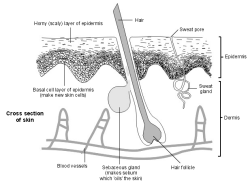According to the National Health Service, psoriasis affects around 2% of people in the UK, men and women alike, and is most common in younger adults.
Psoriasis is a skin condition caused by cells dividing up to 1,000 times faster than normal, causing areas of reddened, lumpy skin covered with silvery flakes. The area affected varies from person to person, but the patches normally appear on dry areas such as knees, elbows and scalp.
There’s no cure for the condition, but there’s a range of treatments available to alleviate symptoms and most sufferers often have periods of remission. Although the causes of psoriasis aren’t clearly understood, experts think that the problem with excessive cell production could be due to a mis-wiring of the immune system where healthy cells are attacked rather than diseased ones. There could also be a genetic element involved.
Sometimes psoriasis can be triggered later in life by an injury or reaction to medicine. If you think you might have the symptoms, the first step is to see your GP for a diagnosis. The initial treatment used will probably be a topical cream containing vitamin D or cortisone, but there are a range of options available.
Although most people aren’t badly affected and can easily keep the condition under control, for others it’s more of a problem. August is National Psoriasis Awareness Month in the USA, run by the National Psoriasis Foundation, which aims to increase awareness of the condition and raise funds to help research. In the UK, The Psoriasis Association provides support for sufferers.
As part of managing your condition, your doctor will normally prescribe a diet that’s high in fruit and vegetables and lower in meat, grain and vegetables. A great way of detoxifying your colon to increase digestive efficiency is with a course of colonic hydrotherapy, a safe, non-chemical treatment that gently washes out intestinal toxins and helps to cleanse the bowel, encouraging healthy bacteria to thrive. It also boosts your immune system, giving your body the best possible chance to manage the psoriasis.
For support, advice or general health tips, why not follow me on Twitter at @CHClinicUK or give me a call on 0161 207 4034? I’m here to help.
Helen x

